#Modern Greek Poetry
Explore tagged Tumblr posts
Text

Constantine P. Cavafy, from “Modern Greek Poetry; ‘The Bandaged Shoulder’”, tr. Kimon Friar.
606 notes
·
View notes
Text
All I love is incessantly reborn All I love is always at its beginning. --Odysseus Elytis (1911-1996), trans. Edmund Keeley and Philip Sherrard
#quote#quotes#Odysseus Elytis#poetry#Greek poetry#Modern Greek poetry#Greek literature#Modern Greek literature
54 notes
·
View notes
Text
Εν τω μηνί Αθύρ (In the month of Athyr)- a poem of Constantinos Cavafis (Cavafy) with English translation
Με δυσκολία διαβάζω στην πέτρα την αρχαία. «Κύ[ρι]ε Ιησού Χριστέ». Ένα «Ψυ[χ]ήν» διακρίνω. «Εν τω μη[νί] Αθύρ» «Ο Λεύκιο[ς] ε[κοιμ]ήθη». Στη μνεία της ηλικίας «Εβί[ωσ]εν ετών», το Κάππα Ζήτα δείχνει που νέος εκοιμήθη. Μες στα φθαρμένα βλέπω «Αυτό[ν]… Αλεξανδρέα» Μετά έχει τρείς γραμμές πολύ ακρωτηριασμένες· μα κάτι λέξεις βγάζω – σαν «δ[ά]κρυα ημών», «οδύνην», κατόπιν πάλι «δάκρυα», και «[ημ]ίν τοις [φ]ίλοις πένθος». Με φαίνεται που ο Λεύκιος μεγάλως θ’ αγαπήθη. Εν τω μηνί Αθύρ ο Λεύκιος εκοιμήθη.
It is hard to read . . . . on the ancient stone. “Lord Jesus Christ” . . . . I make out the word “Soul”. “In the month of Athyr . . . . Lucius fell asleep.” His age is mentioned . . . . “He lived years . . . .”? The letters KZ show . . . . that he fell asleep young. In the damaged part I see the words . . . . “Him . . Alexandrian.” Then come three lines . . . . much mutilated. But I can read a few words . . . . perhaps ���our tears” and “sorrows.” And again: “Tears” . . . . and: “for us his friend mourning.” I think Lucius . . . . was much beloved. In the month of Athyr . . . . Lucius fell asleep .
Translated by George Valassopoulos in E.M. Forster, Pharos and Pharillon, Hogarth Press, 1923 from C. P. Cavafy, Poems 1916-18 as published on the Official Website of the Cavafy Archive, http://www.cavafy.com/
3 notes
·
View notes
Text
rip Narcissus, you would have loved flexing in the mirror at the gym
#poetry#quotes#spilled thoughts#narcissus#echo and narcissus#greek mythology#Greek myth#Greek myth memes#memes#Greek#Greek gods#mythology and folklore#mythology#modern au#rip#gymlife#gym bros
968 notes
·
View notes
Text




"I would eat my way into perdition to taste you"
- Jeanette Winterson, Written on the Body
#aesthetics#photography#art#sculpture#greek sculpture#modern sculpture#renaissance#lovers#the kiss#dark academia#women#aphrodite#quotes#jeanette winterson#poetry#art aesthetic#dark aesthetic#suggestive#intimacy#romantic academia#chaotic academia#dark academia moodboard#dark academia aesthetic#web weaving#moodboard#touch#love#romance#romanticism#meaepost
277 notes
·
View notes
Text
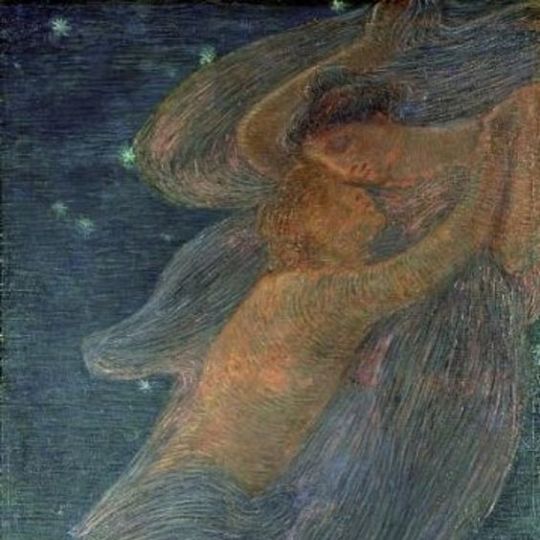
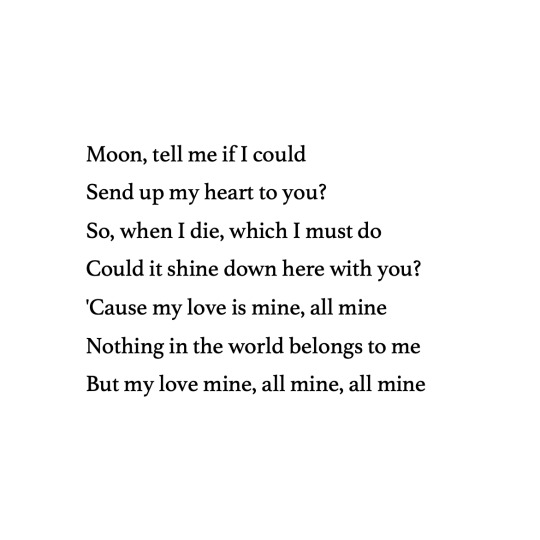
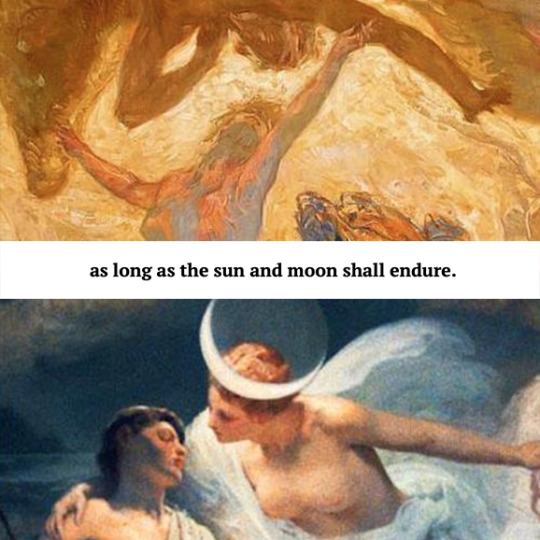
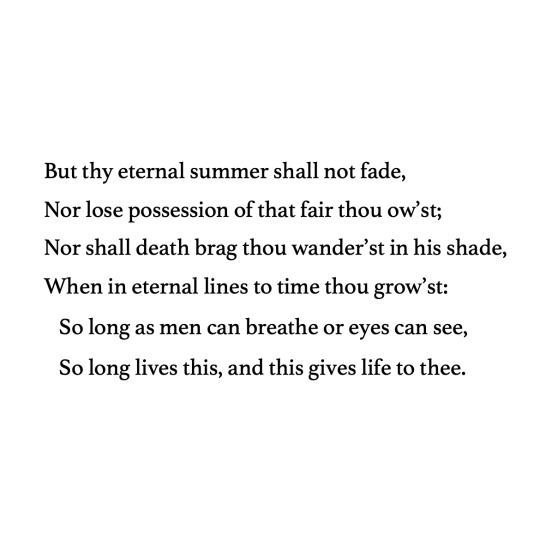
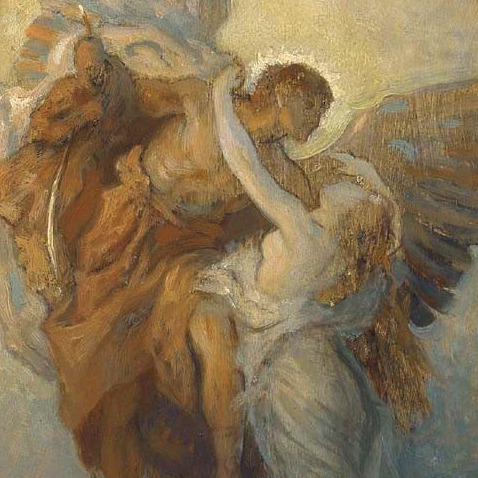
Sun & Moon
requested by @oops-it-is-i
#mitski is modern shakespeare for real#moon wlw and sun mlm solidarity#< that mitski song is about a woman and that shakespeare sonnet is about a man !#my first thought with sun & moon was a good ol' 'the moon will sing' by crane wives / 'sunlight' by hozier / icarus and apollo / toxic love#but that's been done enough so fuck it we're doing transcendent eternal love. unfortunately of a heterosexual variety.#also I'm still playing around with layouts and things so I'm sure any future moodboards will look different#also also. yes I snuck in an anne of green gables quote. as is my right#moodboard#collage#web weave#light academia#romantic academia#dark academia#art#poetry#greek mythology#renaissance#baroque#mitski#william shakespere#selene and endymion#selene#apollo#sun and moon#sun and moon dynamic#renaissance art#painting#oil painting#pre raphaelite#pre raphaelism
258 notes
·
View notes
Text
"listening to music in your target language is the best way to learn it" they said "it'll be fun" they said but now i'm listening to smells like teen spirit in classical latin with weird instrumentals in the background.
#there's do i wanna know too#and gimme gimme gimme in ancient greek😭😭#i figured everyone should know that these exist#look up modern songs in ancient latin and greek on spotify if you're bored lol#chaotic academia#dark academia#academia#classic academia#books#academia aesthetic#art academia#poetry#light academia#romantic academia#green academia#the secret history#dead poets society#ancient greek#ancient greece#latin language#languages#multilingual#smells like teen spirit#nirvana#classical latin#random#text post#text#music#classical music
149 notes
·
View notes
Text
THE MONSTER & THE MAN
One obstacle pierces his soul
and calls him down the dark road –
with heavy sighs, he must carry on,
and at last, the thorn is retrieved –
with agony in his brown eyes –
he suddenly sees:
Fever dreams, scarlet on blue velvet,
like ink drowning in words –
words drowning inside his veins –
words that pleaded in vain –
words so scarlet… so stained.
Empty lines for empty souls
that carry too much inside;
empty pages for empty hands
with nothing else to hide,
nor to control the beast inside his soul.
- Laura Chouette (Ethereal Solitude)
#poetry#dark academia#love quote#light academia#art#literature#love#cottage core#poem#aesthetics#reading#reading goals#oscar wilde memes#oscar wilde#greek posts#ballad#ballads#modern poetry#dark academia poetry#poetrycommunity#poetry deep
13 notes
·
View notes
Text
Eurydice’s Memory
by M.K. Hancock
I’ve been through
Meaningful connections
Among life’s mysteries
A cycling and unorthodox
Series of complexities
Misery in memories
Unresolved grief
My moments
Fragmented to bits
I decode to know
And over the years
With learning and tears
I’ve found them whole again
French Philosopher
Jacques Derrida suggested
deconstruction
As a manner of viewing
Signs and Sign Processes
(What Semiotics calls
Communication)
Deconstruction
Is a form of Semiotic Analysis
AKA a way to see
What’s deep underneath
Communication
Disassembling
Something as
Significant
As the abrupt
Quiet
Behind Orpheus
Who misses
Eurydice
With every shadow
He sees
But his heart
Learns to love
Her memory
Always incomplete
But there in his mind
In each moment
He recalls as a
Widower Twice
To one woman
The day is different
And so is he and
Traces of her linger
However incomplete
The memories
Guide his heart
Her words
His mind
Their love
He takes the grief
As a sign it happened
That his loss, as mysterious
As it was, was truly
Real
That one day
He may hold her again
When it is his turn
To cross the Styx
A final time
Until then
The stones may weep
To hear his grieving
Soul release through
Music
His sweetest songs
Gone with her
#dark academia#modern poetry#poetry#grief poetry#dealing with grief#love#loss#light academia#mythology and folklore#mythology#greek mythology#dark romanticism#poets on tumblr#orpheus#mythological art#symbolism#semiotics#philosopy
18 notes
·
View notes
Text
"And iron Ares, even as, helmetless nor lifting warlike spear, he comes into the house of Hephaistos, in such wise without breastplate and without whetted sword danced smilingly [at the wedding]"
--- Colluthus, Rape of Helen 14 ff on theoi.com
Found the most wonderful description of Ares at the Wedding of Peleus and Thetis. Love how they specifically refrenced every warlike aspect as removed from Ares.
#ares god of war#ares#ares deity#quote#greek myths#greek gods#greek mythology#Ancient Greek poetry#inspiration#story ideas#ares and hephaestus modern story#story planning
11 notes
·
View notes
Quote
When they saw Patroklos dead –so brave and strong, so young– the horses of Achilles began to weep; their immortal nature was upset deeply by this work of death they had to look at. They reared their heads, tossed their long manes, beat the ground with their hooves, and mourned Patroklos, seeing him lifeless, destroyed, now mere flesh only, his spirit gone, defenseless, without breath, turned back from life to the great Nothingness.
C.P. Cavafy, “The Horses of Achilles,” from Collected Poems (translated by Edmund Keeley and Philip Sherrard)
#Achilles#Patroclus#Patroklos#Horses of Achilles#C.P. Cavafy#Guess what I'm reading right now?#I found a copy of Cavafy's poems at a used bookstore and had to buy it.#Too bad that there's a nude mosaic of Dionysus on the cover so that I can't get away with reading it in public!#Modern Greek#translation#not my translation#Edmund Keeley#Philip Sherrard#poem#poetry#quote#Iliad#mythology#death
83 notes
·
View notes
Text
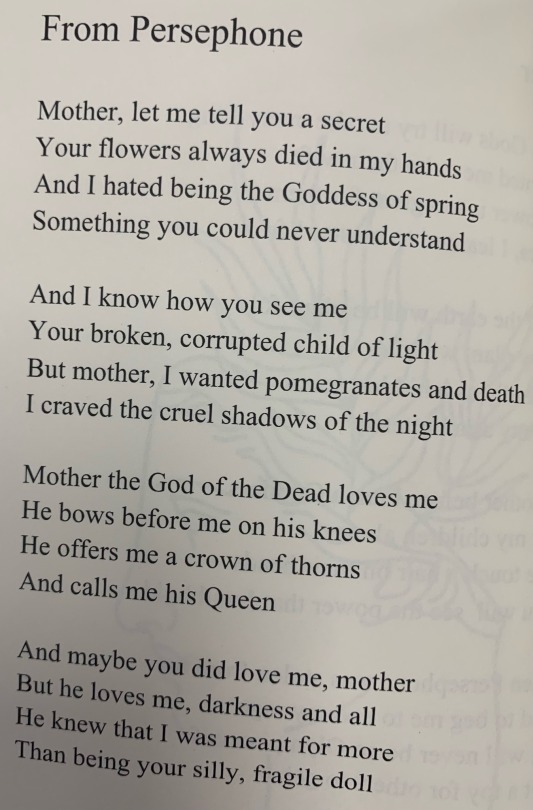
From Modern Mythology: Poems About Gods, Mortals, and Monsters by Nadia McGhee
#Persephone#hades#Demeter#modern mythology#Nadia McGhee#mythology#myth#gods#goddess#greek mythology#poem#poetry#feminist#book
145 notes
·
View notes
Text
Recalque
Estranho e desejoso momento esse em que me encontro.
Perigoso e divertido é o prazer em que me desfruto.
Nada proibido como a história do famoso tabu-fruto.
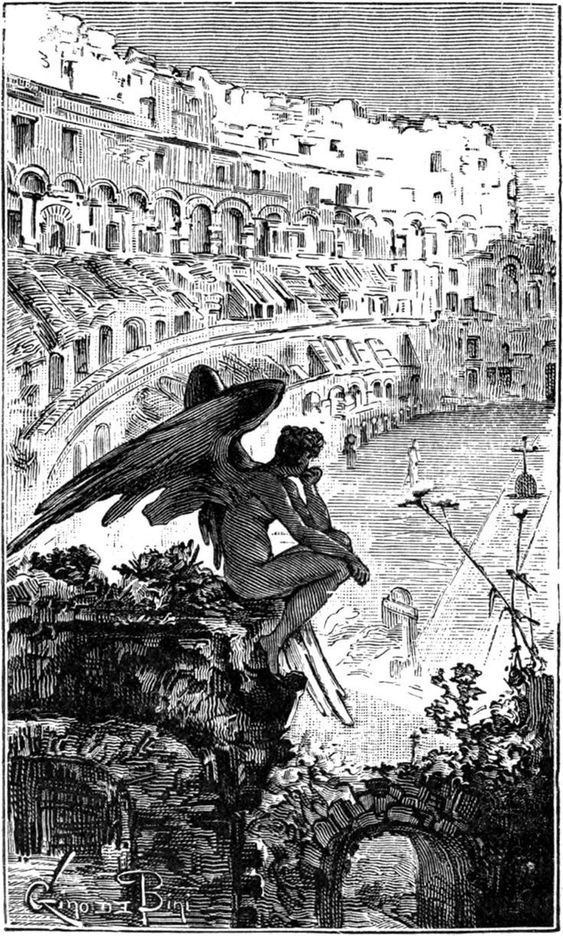
Em fetichista realidade recalcada e moralista,
morrem os inocentes virgens.
Nada permanece puro.
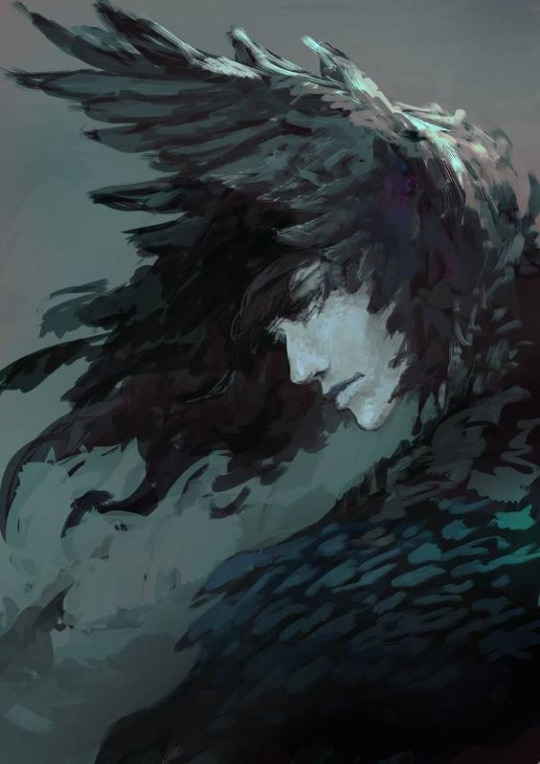
Eva estava certa ao provar do fruto.
Adão foi infeliz e imaturo.
Do jardim inteiro tiro proveito,
seja das flores ou dos frutos.
E como beija flor, espetarei meu bico em tudo.
Nada vai me parar, meu lugar ao Sol vou conquistar
e diferente de Ícaro, vou prosperar para somente então,
as estrelas tocar.

#prosa#poetry#goth#poemas#prose#gothic#poesia#original art#linguistics#prose poetry#artwork#art#artists on tumblr#art history#italian art#my art#illustration#drawings#modern art#poem#poetry on tumblr#short poem#spilled poetry#sad poem#sad poetry#sad thoughts#escritora#escrita#amor#greek gods
8 notes
·
View notes
Text
“Ελένη”(“Helen”). A poem of Giorgos Seferis with English translation
Ελένη
ΤΕΥΚΡΟΣ: …ἐς γῆν ἐναλίαν Κύπρον, οὗ μ’ ἐθέσπισεν
οἰκεῖν Ἀπόλλων, ὄνομα νησιωτικὸν
Σαλαμῖνα θέμενον τῆς ἐκεῖ χάριν πάτρας.
.........................................................
ΕΛΕΝΗ: Οὐκ ἦλθον ἐς γῆν Τρῳάδ’, ἀλλ’ εἴδωλον ἦν.
.........................................................
ΑΓΓΕΛΟΣ: Τί φῄς;
Νεφέλης ἄρ’ ἄλλως εἴχομεν πόνους πέρι;
ΕΥΡΙΠΙΔΗΣ, ΕΛΕΝΗ
«Τ’ αηδόνια δε σ’ αφήνουνε να κοιμηθείς στις Πλάτρες».
Αηδόνι ντροπαλό, μες στον ανασασμό των φύλλων,
συ που δωρίζεις τη μουσική δροσιά του δάσους
στα χωρισμένα σώματα και στις ψυχές
αυτών που ξέρουν πως δε θα γυρίσουν.
Τυφλή φωνή, που ψηλαφείς μέσα στη νυχτωμένη μνήμη
βήματα και χειρονομίες· δε θα τολμούσα να πω φιλήματα·
και το πικρό τρικύμισμα της ξαγριεμένης σκλάβας.
«Τ’ αηδόνια δε σ’ αφήνουνε να κοιμηθείς στις Πλάτρες».
Ποιές είναι οι Πλάτρες; Ποιός το γνωρίζει τούτο το νησί;
Έζησα τη ζωή μου ακούγοντας ονόματα πρωτάκουστα:
καινούριους τόπους, καινούριες τρέλες των ανθρώπων
ή των θεών·
η μοίρα μου που κυματίζει
ανάμεσα στο στερνό σπαθί ενός Αίαντα
και μιαν άλλη Σαλαμίνα
μ’ έφερε εδώ σ’ αυτό το γυρογιάλι.
Το φεγγάρι
βγήκε απ’ το πέλαγο σαν Αφροδίτη·
σκέπασε τ’ άστρα του Τοξότη, τώρα πάει νά βρει
την καρδιά του Σκορπιού, κι όλα τ’ αλλάζει.
Πού είν’ η αλήθεια;
Ήμουν κι εγώ στο�� πόλεμο τοξότης·
το ριζικό μου, ενός ανθρώπου που ξαστόχησε.
Αηδόνι ποιητάρη,
σαν και μια τέτοια νύχτα στ’ ακροθαλάσσι του Πρωτέα
σ’ άκουσαν οι σκλάβες Σπαρτιάτισσες κι έσυραν το θρήνο,
κι ανάμεσό τους —ποιός θα το ’λεγε— η Ελένη!
Αυτή που κυνηγούσαμε χρόνια στο Σκάμαντρο.
Ήταν εκεί, στα χείλια της ερήμου· την άγγιξα, μου μίλησε:
«Δεν είν’ αλήθεια, δεν είν’ αλήθεια» φώναζε.
«Δεν μπήκα στο γαλαζόπλωρο καράβι.
Ποτέ δεν πάτησα την αντρειωμένη Τροία».
Με το βαθύ στηθόδεσμο, τον ήλιο στα μαλλιά, κι αυτό το ανάστημα
ίσκιοι και χαμόγελα παντού
στους ώμους στους μηρούς στα γόνατα·
ζωντανό δέρμα, και τα μάτια
με τα μεγάλα βλέφαρα,
ήταν εκεί, στην όχθη ενός Δέλτα.
Και στην Τροία;
Τίποτε στην Τροία — ένα είδωλο.
Έτσι το θέλαν οι θεοί.
Κι ο Πάρης, μ’ έναν ίσκιο πλάγιαζε σα νά ηταν πλάσμα ατόφιο·
κι εμείς σφαζόμασταν για την Ελένη δέκα χρόνια.
Μεγάλος πόνος είχε πέσει στην Ελλάδα.
Τόσα κορμιά ριγμένα
στα σαγόνια της θάλασσας στα σαγόνια της γης·
τόσες ψυχές
δοσμένες στις μυλόπετρες, σαν το σιτάρι.
Κι οι ποταμοί φουσκώναν μες στη λάσπη το αίμα
για ένα λινό κυμάτισμα για μια νεφέλη
μιας πεταλούδας τίναγμα το πούπουλο ενός κύκνου
για ένα πουκάμισο αδειανό, για μιαν Ελένη.
Κι ο αδερφός μου;
Αηδόνι αηδόνι αηδόνι,
τ’ είναι θεός; τί μη θεός; και τί τ’ ανάμεσό τους;
«Τ’ αηδόνια δε σ’ αφήνουνε να κοιμηθείς στις Πλάτρες».
Δακρυσμένο πουλί,
στην Κύπρο τη θαλασσοφίλητη
που έταξαν για να μου θυμίζει την πατρίδα,
άραξα μοναχός μ’ αυτό το παραμύθι,
αν είναι αλήθεια πως αυτό ειναι παραμύθι,
αν είναι αλήθεια πως οι ανθρώποι δε θα ξαναπιάσουν
τον παλιό δόλο των θεών·
αν είναι αλήθεια
πως κάποιος άλλος Τεύκρος, ύστερα από χρόνια,
ή κάποιος Αίαντας ή Πρίαμος ή Εκάβη
ή κάποιος άγνωστος, ανώνυμος, που ωστόσο
είδε ένα Σκάμαντρο να ξεχειλάει κουφάρια,
δεν το ’χει μες στη μοίρα του ν’ ακούσει
μαντατοφόρους που έρχουνται να πούνε
πως τόσος πόνος τόση ζωή
πήγαν στην άβυσσο
για ένα πουκάμισο αδειανό για μιαν Ελένη.
Γιώργος Σεφέρης. 1955. Κύπρον, οὗ μ᾿ ἐθέσπισεν. Αθήνα: Ίκαρος. Και στον συγκεντρωτικό τόμο: Γιώργος Σεφέρης. [1972] 1985. Ποιήματα. 15η έκδ. Αθήνα: Ίκαρος.
Helen
BY GEORGE SEFERIS
TRANSLATED BY EDMUND KEELEY
Teucer: . . . in sea-girt Cyprus, where it was decreed by Apollow that I should live, giving the city the name of Salamis in memory of my island home. . . . . . . . . . . Helen: I never went to Troy; it was a phantom. . . . . . . . . . . Servant: What? You mean it was only for a cloud that we struggled so much? — Euripides, Helen
‘The nightingales won’t let you sleep in Platres.’
Shy nightingale, in the breathing of the leaves,
you who bestow the forest’s musical coolness
on the sundered bodies, on the souls
of those who know they will not return.
Blind voice, you who grope in the darkness of memory
for footsteps and gestures — I wouldn’t dare say kisses —
and the bitter raving of the frenzied slave-woman.
‘The nightingales won’t let you sleep in Platres.’
Platres: where is Platres? And this island: who knows it?
I’ve lived my life hearing names I’ve never heard before:
new countries, new idiocies of men
or of the gods;
my fate, which wavers
between the last sword of some Ajax
and another Salamis,
brought me here, to this shore.
The moon
rose from the sea like Aphrodite,
covered the Archer’s stars, now moves to find
the heart of Scorpio, and alters everything.
Truth, where’s the truth?
I too was an archer in the war;
my fate: that of a man who missed his target.
Lyric nightingale,
on a night like this, by the shore of Proteus,
the Spartan slave-girls heard you and began their lament,
and among them — who would have believed it? — Helen!
She whom we hunted so many years by the banks of the Scamander.
She was there, at the desert’s lip; I touched her; she spoke to me:
‘It isn’t true, it isn’t true,’ she cried.
‘I didn’t board the blue bowed ship.
I never went to valiant Troy.’
Breasts girded high, the sun in her hair, and that stature
shadows and smiles everywhere,
on shoulders, thighs and knees;
the skin alive, and her eyes
with the large eyelids,
she was there, on the banks of a Delta.
And at Troy?
At Troy, nothing: just a phantom image.
That’s how the gods wanted it.
And Paris, Paris lay with a shadow as though it were a solid being;
and for ten whole years we slaughtered ourselves for Helen.
Great suffering had desolated Greece.
So many bodies thrown
into the jaws of the sea, the jaws of the earth
so many souls
fed to the millstones like grain.
And the rivers swelling, blood in their silt,
all for a linen undulation, a filmy cloud,
a butterfly’s flicker, a wisp of swan’s down,
an empty tunic — all for a Helen.
And my brother?
Nightingale nightingale nightingale,
what is a god? What is not a god? And what is there in between them?
‘The nightingales won’t let you sleep in Platres.’
Tearful bird,
on sea-kissed Cyprus
consecrated to remind me of my country,
I moored alone with this fable,
if it’s true that it is a fable,
if it’s true that mortals will not again take up
the old deceit of the gods;
if it’s true
that in future years some other Teucer,
or some Ajax or Priam or Hecuba,
or someone unknown and nameless who nevertheless saw
a Scamander overflow with corpses,
isn’t fated to hear
messengers coming to tell him
that so much suffering, so much life,
went into the abyss
all for an empty tunic, all for a Helen.
George Seferis, "Helen" from Collected Poems (George Seferis). Translated, edited, and introduced by Edmund Keeley and Philip Sherrard. Copyright © 1995 by George Seferis. Reprinted by permission of Princeton University Press.Source: George Seferis: Collected Poems (Princeton University Press, 1995).
Giorgos Seferis (1900-1971), a career diplomat, was major Greek poet of the 20th century (1963 Nobel Prize of literature).
I remind that the version of the events according to which Helen never went to Troy, but she was in Egypt during the whole Trojan war is of Herodotean origin (The Histories, Book II, 116-117). Euripides later reworked this version, introducing as part of the plot the story that the gods had sent to Troy a phantom in Helen’s place, a phantom for which Greeks and Trojans were killing each other for ten years...
6 notes
·
View notes
Text
Do you think he knew he'd do it?
Before he set off
down down deep into the hot melt
of Hades
when he put down his lute like a judges gavel
when soft grass turned
sulphur
and he thought about seeing her face again.
(wouldn’t you, my love?)
And what did they ask him after?
His mates at
the pub in the years that
followed, did he think he was tricked
or fooled did he not believe
it was her-
sweat of soft palms pressed its
religious.
(look at me like you have to,
look like it’ll kill me)
Was he crying?
When he turned like a dead man in
his grave. Did he laugh or scream
or reach out to kiss her
and what was
that empty taste that fell
on his tongue? A question
without answer a record with no
music a prayer
taken in silence
to a dead god.
(wouldn’t you take
my bones between your
bare teeth just
for a second?)
Aphrodite on her highest mountain,
won’t you tell me of Eurydice's
smile when she
saw her lover’s eyes.
#modern poetry#original poem#poetry#poem#poems on tumblr#prose#love poem#ancient greek#greek mythology#orpheus#orphydice#orpheus and euridyce#GUESS WHOS BACK WITH ANOTHER FUCKING GREEK MYRH POEM#back on my bullshit
7 notes
·
View notes
Text
Growing up hearing parts of stories like The Iliad as a child, I idolized the Achaean Greeks because they were so cool and like the horse thing was *an absolutely brilliant battle tactic.* Actually reading The Iliad is like "Oh gods, why are the Achaean Greeks committing so many war crimes?????? Why are the Trojans the only people who actually have honor and decency??" and immediately siding with Troy because the majority of them Do Not Deserve This and have been majorly unfortunate.
#Except Paris#Paris sucks#But the rest of Troy didn't deserve to share in his punishment#To be fair#can't judge a city for war crime standards that weren't standardize yet/modern lens? Unclear. I still be suspicious.#but also it's supposed to be a moral tale of what to do and what to not to do#and it's interesting how they made the Greeks (protagonists) 'how not to do war 101 and still be honorable'#English Lit for College#The Iliad#I read the aeneid in highschool and now rereading#Actually reading classics has been an Experience#Not a licensed literature discourse#but here's my take#Achilles is not the man most of my class thinks he is#Brb-on-a-ramble?#Brb-on-a-ramble#I don't necessarily understand classic literature or epic poetry though fair warning but we're trying and we're making progress
9 notes
·
View notes